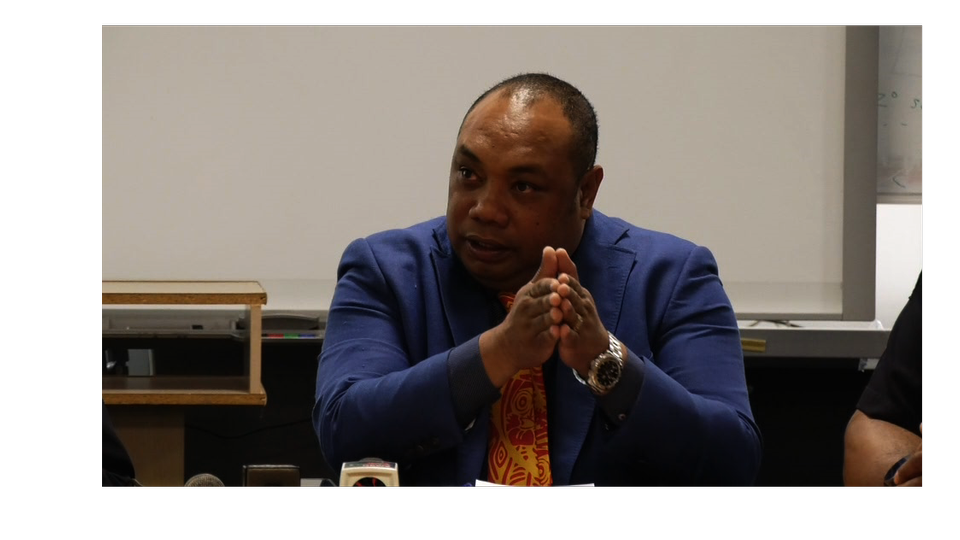 OF the 5,000 medicines procured for use in Papua New Guinea , only 80 are tested for quality assurance by the Health Department, a public inquiry has revealed. The joint inquiry into the Health Department is by the Special Parliamentary Committee on Public Sector Reform and the Permanent Parliamentary Committee on Public Accounts. East Sepik Governor Allan Bird said there were two distinct branches (pharmaceutical standard services and medical supply and distribution) that dealt with medicine quality and assuming medicines came in batches how often the branch conducted quality test. Health Department technical adviser, quality, Graham Wavimbukie said testing was not the only option to check quality of medicines as it was an end to end process that looked at other things as well. “Testing is only one part of the quality assurance,” he said. “In the branch, we have product registration (deals with import permit) where we have to register all medicine coming in and then we have GMP (good manufacturing practice) clearance for the manufacturers and afterwards when the product is on the market then we can do sampling and testing and that’s where the lab comes in. “So far, we have done 80 samples as part of process of getting the lab established and start running testing in the country.”
Wavimbukie said the lab was opened in 2017, but technically it was not in a position to start tests as requirements for competence had to be satisfied, equipment needed to qualify to International Standardisation Organistion (ISO) ABD World Health Organisation standards including followed by the accumulation of training data for two years. “So it took a while for us to get to a point where we were able to sample and test.” Wavimbukie said in the catalogue there were about 1,500 pharmaceuticals alone but in the entire catalogue it’s about 5,000 items, hence it is not really sufficient to conduct only 80 samplings. “We would like to test as much as we can. “In theory, you can do that but in practice, that’s not really possible.” Wavimbukie said there was a routine requirement to run sampling but if there was an issue in the hospital or the doctor was not satisfied with the treatment outcome, then that can prompt testing to be done. Chair urges Health Dept to address bribery claims CHAIRMAN of the Permanent Parliamentary Committee on Public Accounts Aiye Tambua says the Health Department must deal with staff that have been alleged to accept bribes in the medicine procurement and supply process. He said this during the joint public inquiry into the Health Department with the Special Parliamentary Committee on Public Sector Reform yesterday. Tambua said this inquiry started because of the gross amount of complaints and other issues arising within the department and the nature of contracts delivered, part of which was the procurement system. He said there were two allegations regarding department staff involved in certain issues which were not deemed legal and going against the Public Service Management Act. He said the first was the allegation by Global Customers that certain officers in the department received bribes. He said the second was allegation of certain staff issued a catering contract of K600,000 and now that staff had been promoted. Tambua asked Health secretary Dr Osborne Liko about what was done to address those issues. Dr Liko said the staff who was implicated in the allegations of bribery went through fraud squad investigations but due to so many other reasons, including the Coronavirus (Covid-19), there was a delay so the staff went to the Public Service Commission and was reinstated. “We are taking into account the public interest and the Government interest so the officer has been suspended,” he said. Cash flow challenges contribute to poor medicine supply, says Liko CASH flow challenges have contributed to the poor medicine supply and delivery in the country, Health secretary Dr Osborne Liko says. He said the Health Department was part of the supply chain of medicine procurement and delivery that depended on Government funding to do its work. He was speaking during the joint public inquiry into the Health Department by the Special Parliamentary Committee on Public Sector Reform and the Permanent Parliamentary Committee on Public Accounts. “I’ll put this on record for your consideration and a classic example is in 2021 appropriation. “We asked for K300 million, we were given only K190 million.” “The carry-overs of our money, there are money that we owe to suppliers, from K86 million we add K30 million on top. “For 2022, we have K90 million debts we owe to our suppliers. “How on earth will any suppliers continue to give us goods (medicine supplies) on credit. “We thank the Government for the wisdom to support us last year in paying carry-over of almost K90.3 million.” Health centres, aid posts missing out on drugs, inquiry told Health centres and aid posts have not received drugs for the past eight months, deputy secretary for the Health Department (NDoH) Alva Lionel says. Lionel said that there were no contracts yet in tender to deliver drugs throughout the country since tenders had been sitting with the National Procurement Commission (NPC) without any validation for eight months. “Post PNG has been advised to bid and they came and did a presentation to us but there are no contracts yet. “It is affecting us (NDoH) and the distribution of drugs because for eight months there has been no decision from the NPC,” she said. Chairman of the Special Parliamentary Committee on Public Sector Reform, Northern Governor Gary Juffa said this meant that provincial health authorities and provincial governments were sending their own staff to collect the drugs from the regional stores. “It was even the view of the Parliamentary Committee on Public Accounts during their inquiry, that a number of the logistics companies hired since, have not been meeting the expectations of aid posts or health sectors in the delivery of drugs. “There was a company that was exposed for being paid to deliver drugs from Badili to the health centre in Kaugere, but the health centre informed us (the committee), that they had never received any of the drugs from Badili but had to go and pick it up themselves,” he said. Juffa recalled that when Post PNG were delivering the first aid kits and medical supplies under the contract with Australia, they had the capacity and the capability to deliver efficiently because they took photos and uploaded them so that officials were aware when the drugs were delivered. He noted that the NDoH had procured the services of various other companies, since discontinuing with Post PNG that was recently registered. Juffa referred to the example of a recently registered company that was paid K84 million to deliver drugs but did not meet the standard set by Post PNG. “During the first enquiry, Post PNG was invited to talk about their experiences and expectations and it was shown that they had a very effective delivery mechanism. “There was no recollection of any complaints about a lack of delivery.” Source : The National/PNG Health Watch Next : Taiwan Supports Papua New Guinea Health Sector Comments are closed.
|
PNG Health NewsThis websites provides all the latest Health News , insurance, health tips, health and scholarships in Papua New Guinea Top Links |
- Home
- PNG Health News
- Health Tips
- Jobs
- Health Scholarships
- Nursing Colleges in PNG
- Health Ministry
- Private Hospitals in PNG
- Health Department
- Insurance
- Institutions
- CHW Colleges in PNG
- Health Issues
- About
- Contact
- Privacy Policy
- COVID-19 in Papua New Guinea
- Enga School of Nursing
- PNG Health Database
- Hospitals in PNG
|
Home : News : Health Insurance : Training : Health Training Institutions : Hospitals : Provincial Hospitals : Contact: Privacy Policy
|

 RSS Feed
RSS Feed
